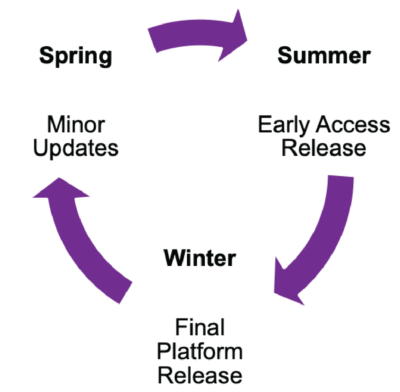This is an interesting year for Ed-Fi. We’re going to try and solve a problem that makes everyone in the community uncomfortable. The problem I’m referencing is especially challenging because while everyone agrees with the problem, no one wants the solution. You might already know exactly the problem I speak of…
How do you change a data standard?!
Ed-Fi had 4 years of artificial stability with the Suite 3 version protecting against breaking changes. It’s artificial because we have a growing back log of changes the community really wants to make but hasn’t. You can look at the standard’s outdated nomenclature for gender to see the problem clearly. Making those breaking changes is something everyone can agree with, but we need to build an ecosystem that supports change.
Consistency is Key Even Amidst Change
Let’s embark on this change together and set some expectations well in advance. Early transparency and feedback will enable everyone to get ahead of change and what impact it has for us. If you are new to Ed-Fi, this will help you better understand what you are getting and how long your vendors will support you. If you are a vendor then it’s helpful to hear from the community what support they need from you that isn’t “I want everything for all time.”
Release Timing

The typical release cadence each year will be an early release in the summer. This early release is only intended for testing and feedback of the upcoming changes. We follow up the summer release with a winter platform release. The winter platform release is the official release that is intended for the following school year. There may also be spring releases which will fix bugs or provide minor non-breaking enhancements. While we always encourage people to remain on the latest versions, minor revisions are not mandatory for vendors to adopt.
Support Cycle
Each of these releases will have Ed-Fi support for 3 years, and this what the release cycle may look like.

Notice there is a year off in the mix. Our goal is to limit breaking data standard changes to only 2 consecutive years. We will also try to group changes by domain to minimize impact to the vendor community supporting each version. By supporting each version for 3 years and including a year of minor updates, vendors should only have to support 2 versions simultaneously which is an improvement from today’s expectations. Meanwhile, education agencies can adopt Ed-Fi and get 5 years of stability with only one planned update throughout the process.
Vendor Benefits Revisited
Clear expectations of version support are a big win. Vendors also get an opportunity to provide feedback before they need to adopt the latest standard between summer and the end of the year. This timing allows vendors to provide better feedback and support for their customers. The biggest benefit to this new well-defined release cadence is vendors new ability to plan ahead with their resources.
There is still a roadmap to guide you on upcoming changes and you also have a regular Ed-Fi release cadence when resource planning.
Education Agencies Win Too!
Removing the ambiguity on releases will make district’s data much more accessible. It will be easier to align vendor services to your active Ed-Fi implementation. The recent recommendation for single year collections also allows local education agencies to stay current with each new school year. The transparency with release cadences and the opportunity to stay current will help keep each new school year’s data up-to-date and ready to be utilized.
Final Thoughts
This isn’t a seismic shift in the release strategy that Ed-Fi is undertaking. We’re just taking extra steps to lead with transparency and long-term guidance so everyone in the community can better plan for success in their upcoming school year. Aligning the vendor’s needs with the district’s expectations can better facilitate unlocking student data even as the community needs evolves.
How do we change a data standard? By making the timing consistent and transparent, encouraging early feedback, and grouping changes to minimize impact.

